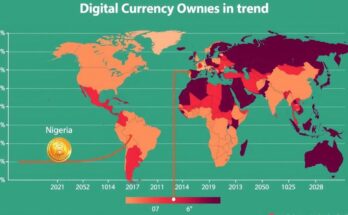The EBID is committed to maintaining financial relations with Mali, Niger, and Burkina Faso despite political tensions within ECOWAS, emphasizing strong repayment records and the independence of its financial activities from political issues.
The Economic Community of West African States (ECOWAS) is currently facing political tensions; however, the ECOWAS Bank for Investment and Development (EBID) has expressed a firm commitment to sustaining its financial partnerships with Mali, Niger, and Burkina Faso. Notably, the situation arises as these three nations are navigating their departure from ECOWAS, following the establishment of the newly-formed Alliance of Sahel States (AES). During the 89th Ordinary Session of the Bank’s Board of Directors, held on October 1, 2024, in Lomé, Dr. George Agyekum Donkor, President of EBID, articulated the Bank’s position, emphasizing the importance of maintaining strong financial relations with these members despite existing political constraints. He noted that both Burkina Faso and Niger are fulfilling their loan repayment obligations. Furthermore, he indicated that the exit of these nations from ECOWAS would not impact their commitments to repayment, asserting that “the Bank remains a financial institution rather than a political one.” This assertion harmonizes with Togo’s broader efforts to enhance bilateral exchanges, particularly in customs, with the aforementioned countries. Established in 1999, EBID boasts an authorized capital of $3.5 billion as of the close of 2023, with a substantial 70% held by regional stakeholders from the 15 ECOWAS member states. The AES’s contribution constitutes 6.29% of the total capital, while Nigeria, Ghana, and Togo hold 31.24%, 15.71%, and 3.43%, respectively.
The relationship dynamics within ECOWAS have become increasingly complex, especially with the political climate surrounding the member nations. The recent formation of the Alliance of Sahel States by Mali, Niger, and Burkina Faso signifies a shift in regional alliances, leading to their potential exit from ECOWAS. This situation poses challenges not only for political relations but also for financial institutions tied to these nations. As vital financial partners, EBID’s commitment to maintaining strong ties with these countries is crucial for ongoing development and economic stability in the region.
In conclusion, the EBID’s commitment to sustaining its financial partnerships with Mali, Niger, and Burkina Faso demonstrates a strategic focus on economic collaboration amidst political turmoil within ECOWAS. The Bank’s position, reinforced by positive repayment trends from these countries, underscores its role as a financial institution, independent of political affiliations. This approach is fundamental in fostering regional economic development, even as countries explore alternate alliances.
Original Source: www.togofirst.com




